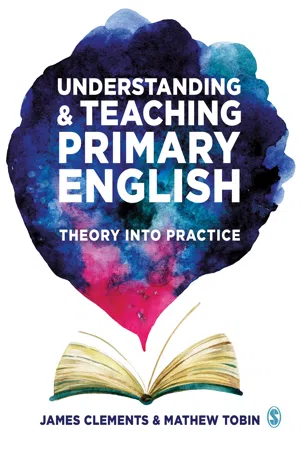
Understanding and Teaching Primary English
Theory Into Practice
- 344 pages
- English
- ePUB (mobile friendly)
- Available on iOS & Android
About this book
Inspiring and supporting you to become an insightful, creative and professional teacher of primary English.
Teaching children English is an opportunity to give them skills that will enrich their entire lives and is a crucial part of their intellectual development.Covering all major aspects of primary English and following the foundations set in the early years, this booktakes you throughyour teacher training andinto yourearly career in the classroom.
Each topic explores what we know from theory and the latest research, and then demonstrates how you can use this understanding in practice. Drawing on the authors' own knowledge and experiences in the classroom, the book is full of practical advice and strategies to support your own teaching, while also helping you develop your subject knowledge.
Key topics include:
·Reading and writing in the early years
·Curriculum design and planning
·Promotive reading for pleasure and teachers as readers
·Teaching writing and its role as a form of communication
·Vocabulary development and word knowledge
·Assessment for formative and summative purposes
·Oracy and spoken language development
Frequently asked questions
- Essential is ideal for learners and professionals who enjoy exploring a wide range of subjects. Access the Essential Library with 800,000+ trusted titles and best-sellers across business, personal growth, and the humanities. Includes unlimited reading time and Standard Read Aloud voice.
- Complete: Perfect for advanced learners and researchers needing full, unrestricted access. Unlock 1.4M+ books across hundreds of subjects, including academic and specialized titles. The Complete Plan also includes advanced features like Premium Read Aloud and Research Assistant.
Please note we cannot support devices running on iOS 13 and Android 7 or earlier. Learn more about using the app.
Information
Part 1 English in the Early Years
- 1 Reading in the Early Years: Theory 3
- 2 Reading in the Early Years: Practice 17
- 3 Writing in the Early Years: Theory 32
- 4 Writing in the Early Years: Practice 46
1 Reading in the Early Years: Theory
- Introduce the concept of emergent readers
- Explore the impact that early reading experiences have on later reading
- Consider the theoretical underpinnings of different precursors to reading
Introduction
…sets the standards that all early years providers must meet to ensure that children learn and develop well and are kept healthy and safe. It promotes teaching and learning to ensure children’s ‘school readiness’ and gives children the broad range of knowledge and skills that provide the right foundation for good future progress through school and life.(DfE, 2017)
An overview of the emergent reader

- What might the implications be for a child starting school who has not had the rich early-reading experiences outlined?
- How might a teacher or a school mitigate for this?
- What might be the implications for curriculum design?
- What might be the implications for classroom teaching?
Facilitative parents and conventional parents

Table of contents
- Cover
- Half Title
- Acknowledgements
- Title Page
- Copyright Page
- Contents
- About the Authors
- Introduction
- Part 1 English in the Early Years
- 1 Reading in the Early Years: Theory
- 2 Reading in the Early Years: Practice
- 3 Writing in the Early Years: Theory
- 4 Writing in the Early Years: Practice
- Part 2 Oracy and Spoken Language
- 5 Talk, Oracy and Spoken Language: Theory
- 6 Talk, Oracy and Spoken Language: Practice
- Part 3 Reading
- 7 The Simple View of Reading: Theory
- 8 The Simple View of Reading: Practice
- 9 Becoming a Reader: Theory and Practice in Reading for Pleasure
- 10 Teachers as Readers – Understanding the Importance of Children’s Literature: Theory and Practice
- Part 4 Writing
- 11 The Teaching and Learning of Writing: Theory
- 12 The Teaching and Learning of Writing: Practice
- 13 Teaching Grammar and Punctuation in Context: Theory and Practice
- Part 5 Vocabulary and Word knowledge
- 14 Building Vocabulary and Word Knowledge: Theory and Practice
- Part 6 Curriculum, Planning and Assessment
- 15 Curriculum and Planning in Primary English: Theory
- 16 Curriculum and Planning in Primary English: Practice
- 17 Assessment in English: Theory
- 18 Assessment in English: Practice
- Index